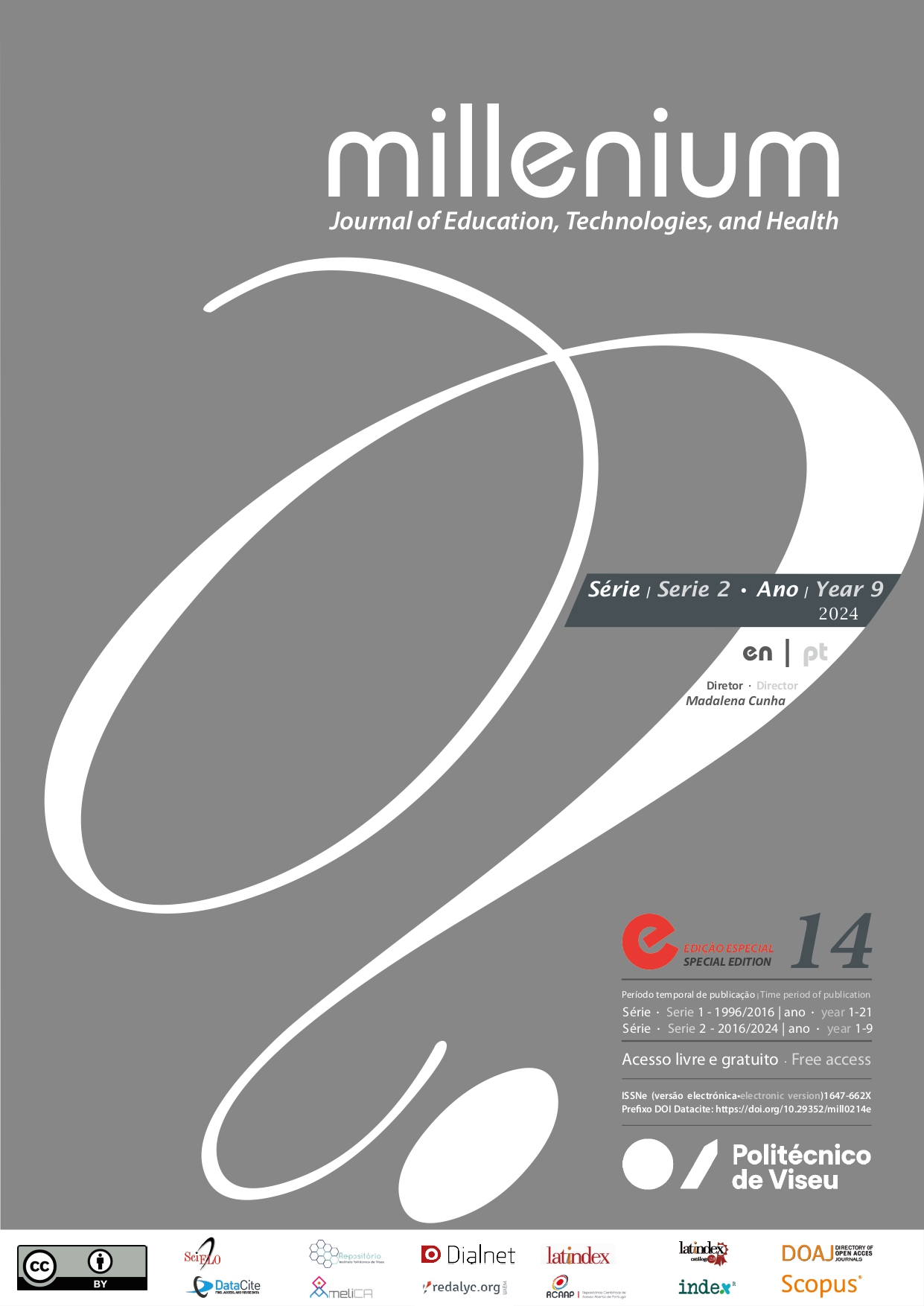Autonomous nursing interventions to improve sleep in palliative care patients: scoping review
DOI:
https://doi.org/10.29352/mill0214e.30028Keywords:
palliative care; sleep; autonomous nurse interventionsAbstract
Introduction: In palliative care, sleep disorders are a challenge, with insomnia and hypersomnia being the most frequently reported. Sleep patterns can be improved by implementation of non-pharmacological interventions.
Objective: To map and synthesize the evidence of autonomous nursing interventions to improve the quality of sleep patterns in palliative care patients.
Methods: Scoping review, based on the Joanna Briggs Institute methodology that follows the eligibility criteria based on Population, Concept and Context. The search was conducted in two databases: CINAHL Complete and MEDLINE Complete. The analysis of the relevance of the articles and data extraction was carried out by two independent reviewers. The inclusion criteria were the adult population, in need of palliative care and the description of non-pharmacological interventions to improve the quality of sleep patterns.
Results: Five studies were analysed and the non-pharmacological interventions present were identified: cognitive-behavioural and environmental intervention, hypnotherapy, the use of lavender oil and therapeutic touch.
Conclusion: All the studies analyzed identify non-pharmacological strategies, which can constitute autonomous nursing interventions that are essential for improving the sleep pattern of palliative care patients. Although the strategies applied were different, all authors demonstrated an effective improvement in the quality of the participants' sleep pattern after implementing them.
Downloads
References
Arksey, H., & O’Malley, L. (2005). Scoping studies: Towards a methodological framework. International Journal of Social Research Methodology, 8(1), 19–32. https://doi.org/10.1080/1364557032000119616
Aslan, K. S. U., & Çetinkaya, F. (2021). The effects of therapeutic touch on spiritual care and sleep quality in patients receiving palliative care. Perspectives in Psychiatric Care, 58(1), 374–382. https://doi.org/10.1111/ppc.12801
Bernatchez, M. S., Savard, J., Savard, M. H., & Aubin, M. (2018). Feasibility of a Cognitive-Behavioral and Environmental Intervention for Sleep-Wake Difficulties in Community-Dwelling Cancer Patients Receiving Palliative Care. Cancer Nursing, 42(5), 396–409. https://doi.org/10.1097/NCC.0000000000000603
Carley, D. W., & Farabi, S. S. (2016). Physiology of sleep. Diabetes Spectrum, 29(1), 5–9. https://doi.org/10.2337/diaspect.29.1.5
Decreto-Lei n.º 161/96 do Ministério da Saúde: Regulamento do Exercício Profissional do Enfermeiro. (1996). Diário da República n.º 205, Série I de 04-09-1996. https://files.diariodarepublica.pt/1s/1996/09/205a00/29592962.pdf
Hajjar, R. R. (2008). Sleep Disturbance in Palliative Care. Clinics in Geriatric Medicine, 24(1), 83–91. https://doi.org/10.1016/j.cger.2007.08.003
International Council of Nurses. (2019). Classificação Internacional Para a Prática de Enfermagem Browser. https://www.icn.ch/what-we-do/projects/ehealth-icnptm/icnp-browser
Karna, B., & Grupta, V. (2021). Sleep Disorder. StatPearls [internet]. https://www.ncbi.nlm.nih.gov/books/NBK560720/
Mercadante, S., Adile, C., Ferrera, P., Masedu, F., Valenti, M., & Aielli, F. (2017). Sleep disturbances in advanced cancer patients admitted to a supportive/palliative care unit. Supportive Care in Cancer, 25(4), 1301–1306. https://doi.org/10.1007/s00520-016-3524-4
Mercadante, S., Aielli, F., Adile, C., Ferrera, P., Valle, A., Cartoni, C., Pizzuto, M., Caruselli, A., Parsi, R., Cortegiani, A., Masedu, F., Valenti, M., Ficorella, C., & Porzio, G. (2015). Sleep Disturbances in Patients with Advanced Cancer in Different Palliative Care Settings. Journal of Pain and Symptom Management, 50(6), 786–792. https://doi.org/10.1016/j.jpainsymman.2015.06.018
Monteiro, P., Fernandes, R., & Ramos, A. R. (2017) Sintomas neuropsíquicos. In E. Freire. Guia prático de controlo sintomático (pp. 101-117). https://www.spmi.pt/guia-pratico-de-controlo-sintomatico/
Peters, M. D. J., Marnie, C., Tricco, A. C., Pollock, D., Munn, Z., Alexander, L., McInerney, P., Godfrey, C. M., & Khalil, H. (2020). Updated methodological guidance for the conduct of scoping reviews. JBI Evidence Synthesis, 18(10), 2119–2126. https://doi.org/10.11124/JBIES-20-00167
Plateforme CEPS. (2020). CLASSIFICATION INM. https://plateformeceps.www.univ-montp3.fr/fr/nos-services/classificationinm
Plaskota, M., Lucas, C., Pizzoferro, K., Saini, T., Evans, R., & Cook, K. (2012). A hypnotherapy intervention for the treatment of anxiety in patients with cancer receiving palliative care. International Journal of Palliative Nursing, 18(2), 69–75. https://doi.org/10.12968/ijpn.2012.18.2.69
Savard, J., & Morin, C. M. (2001). Insomnia in the context of cancer: A review of a neglected problem. Journal of Clinical Oncology, 19(3), 895–908. https://doi.org/10.1200/JCO.2001.19.3.895
Sela, R. A., Watanabe, S., & Nekolaichuk, C. L. (2005). Sleep disturbances in palliative cancer patients attending a pain and symptom control clinic. Palliative and Supportive Care, 3(3), 23–31. https://doi.org/10.10170S1478951505050042
Tricco, A. C., Lillie, E., Zarin, W., O’Brien, K. K., Colquhoun, H., Levac, D., Moher, D., Peters, M. D. J., Horsley, T., Weeks, L., Hempel, S., Akl, E. A., Chang, C., McGowan, J., Stewart, L., Hartling, L., Aldcroft, A., Wilson, M. G., Garritty, C., … Straus, S. E. (2018). PRISMA extension for scoping reviews (PRISMA-ScR): Checklist and explanation. Annals of Internal Medicine, 169(7), 467–473. https://doi.org/10.7326/M18-0850
World Health Organization. (2020). WHO Definition of Palliative Care. World Health Organization. https://www.who.int/news-room/fact-sheets/detail/palliative-care
Yildirim, D., Kocatepe, V., Can, G., Sulu, E., Akls, H., Sahin, G., & Aktay, E. (2020). The Effect of Lavender Oil on Sleep Quality and Vital Signs in Palliative Care: A Randomized Clinical Trial. Complementary Medicine Research, 27(5), 328–335. https://doi.org/10.1159/000507319
Downloads
Published
How to Cite
Issue
Section
License
Copyright (c) 2024 Millenium - Journal of Education, Technologies, and Health

This work is licensed under a Creative Commons Attribution 4.0 International License.
Authors who submit proposals for this journal agree to the following terms:
a) Articles are published under the Licença Creative Commons (CC BY 4.0), in full open-access, without any cost or fees of any kind to the author or the reader;
b) The authors retain copyright and grant the journal right of first publication, allowing the free sharing of work, provided it is correctly attributed the authorship and initial publication in this journal;
c) The authors are permitted to take on additional contracts separately for non-exclusive distribution of the version of the work published in this journal (eg, post it to an institutional repository or as a book), with an acknowledgment of its initial publication in this journal;
d) Authors are permitted and encouraged to publish and distribute their work online (eg, in institutional repositories or on their website) as it can lead to productive exchanges, as well as increase the impact and citation of published work
Documents required for submission
Article template (Editable format)





